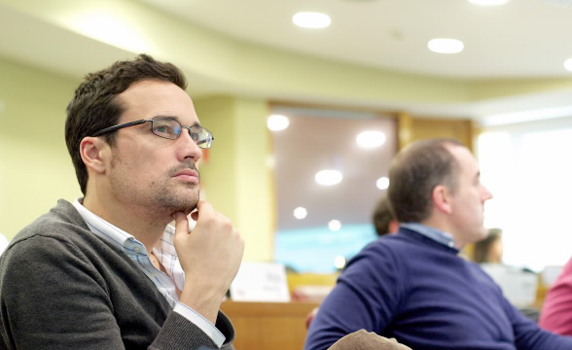
The fifth EMBA Alumni reunion was held yesterday on IESE’s Madrid campus. Dean Francisco Iniesta welcomed those taking part in a meeting that discussed various aspects of the current economic situation. During his speech, Prof. Iniesta congratulated the EMBA program for its “consolidation,” making it IESE’s “star attraction” in Madrid.
The professor used the occasion to remind his audience that five EMBA clubs have been set up on the Madrid campus. These groups cover five professional areas (finance, energy, entrepreneurship, aerospace and healthcare) and “through their extracurricular activities, help to complement the education received in IESE’s classrooms.” After highlighting the consolidation of the Global Leadership Series and the establishment of the Executive MBA Brazil, the professor underlined the success of the Continuous Education Program sessions and announced the creation of a special cycle on the economy to be held within these sessions.
The first speech at the fifth EMBA Alumni Reunion, titled “the Economic Situation”, was led by IESE professors Juan J. Toribio and Javier Díaz-Giménez. Both experts agreed that there was little cause for optimism in the short and medium term.
Reforms to Get Out of Crisis
Prof. Díaz-Gímenez pointed out that in 2013 the global economy will grow by 3.5% thanks to emerging countries such as China, Brazil and India. But the outlook is different in the eurozone and, specifically, in the Mediterranean periphery (Italy, Spain, Portugal and Greece). These four countries are likely to have negative growth this year. On the other hand, Ireland’s GDP will grow by 1%. “In the medium term it’s very difficult to maintain such large differences of competitiveness as those demonstrated by these rates of growth,” he said. To overcome this, “deep and serious reform” is required. “With more public spending cuts we’re not going to get beyond where we are now,” he said.
In the professor’s view, the future of the euro depends on establishing banking and fiscal union. “The European economy is very weak and vulnerable to events,” he said.
Prof. Toribio said that at present there was a feeling that the current situation is better than that of a few months ago. This is based on three factors: the consolidation of the euro, which has had positive effects in Spain such as the repatriation of capital; changes in the private sector that have improved competitiveness and an equilibrium in the balance of payments as well as cleaning up the banking sector.
“But there are still problems: a high level of unemployment, low growth, the lack of credit in the financial system and high public debt. It’s impossible to raise consumer spending when there are six million people out of work and almost three million who are not receiving any money at all,” he warned “Have we hit bottom yet? The answer is no,” Toribio said. Nevertheless, he said “it is probable that things will get better during this year and that by 2014 we will have some positive numbers.”
In conclusion, he emphasized the need to take stronger measures “to reduce the structural deficit of the Spanish public sector” which would involve reforming the pension system, public services and the public administration. “We also have just take more steps to reform the labor market but this requires a change of outlook and culture,” he said.
Diversification and Internationalization
The second session, titled “The Innovation, Diversification and Internationalization Process in a Industrial Group” was moderated by IESE Prof. José R. Pin. The CEO of Grupo Villar-Mir and president of the Madrid Alumni Chapter, Tomás García-Madrid, gave a talk.
Diversification and internationalization are the two key factors behind the success of this industrial group that now has a presence in 40 countries and has 27,000 employees around the world. With a turnover of €6,8 billion in sales in 2012 and EBITDA of €1,514 billion, the group is involved in a variety of different businesses (steel, real estate, fertilizers, energy, concessions and construction). “This diversification has allowed us to grow, reduce risks and take advantage of opportunities,” he said. The same could be said about internationalization.
In regard to innovation, he said that R+D+i was fundamental for the group’s growth. “We develop our own technology whenever possible because it leads to better productivity and it gives us a wider management margin,” he said. In any case, he said that in business it isn’t a case of anything goes. “Integrity, honesty and ethics mark the limits of our playing field and all aspects of our activities.”
The next Global Alumni Reunion will be held on the Barcelona campus on November 7 and 8.